 Petzlover
Petzlover Cao da Serra de Aires is originated from Portugal but Schnorkie is originated from United States. Cao da Serra de Aires may grow 25 cm / 10 inches higher than Schnorkie. Cao da Serra de Aires may weigh 21 kg / 47 pounds more than Schnorkie. Both Cao da Serra de Aires and Schnorkie has almost same life span. Cao da Serra de Aires may have less litter size than Schnorkie. Both Cao da Serra de Aires and Schnorkie requires Moderate Maintenance.
Cao da Serra de Aires is originated from Portugal but Schnorkie is originated from United States. Cao da Serra de Aires may grow 25 cm / 10 inches higher than Schnorkie. Cao da Serra de Aires may weigh 21 kg / 47 pounds more than Schnorkie. Both Cao da Serra de Aires and Schnorkie has almost same life span. Cao da Serra de Aires may have less litter size than Schnorkie. Both Cao da Serra de Aires and Schnorkie requires Moderate Maintenance.
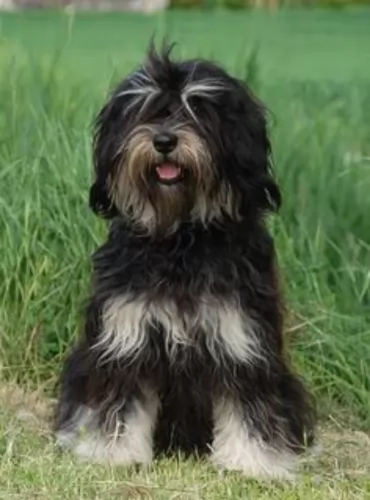 Ancestors of the Cao da Sera de Aires were used for herding livestock in the Serra de Aires and Alentejo, Portugal. This herding dog is native to Portugal and throughout the 20th Century he was kept as a working dog.
Ancestors of the Cao da Sera de Aires were used for herding livestock in the Serra de Aires and Alentejo, Portugal. This herding dog is native to Portugal and throughout the 20th Century he was kept as a working dog.
Known also as the Portuguese Sheepdog, Portuguese Shepherd Dog or Serra de Aires Mountain Dog, there are some questions surrounding the breed's ancestry as there are few records of dogs before 1900. The dog is thought to be related to the Pyrenean and Catalan Sheepdogs and that it has descended from Briards which were imported into Portugal and crossed with the Pyrenean Sheepdog.
The Cão da Serra de Aires breed standard was accepted by the Portuguese Kennel Club, and the breed was recognized internationally in 1996. The dog was also recognized by the United Kennel Club in the Herding Group in 2006.
 This dog is a cross between the Miniature Schnauzer and the Yorkshire Terrier.
This dog is a cross between the Miniature Schnauzer and the Yorkshire Terrier.
It’s not a purebred dog and is known as a designer dog. These dogs inherit characteristics from both of its purebred parents.
The origins and history of these breeds is often unknown with their being no records as to when or where breeders started developing them. This particular mixed breed dog originated in the United States.
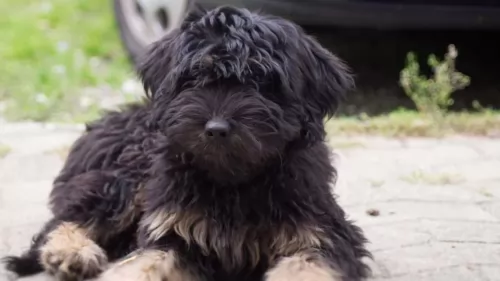 The beautiful Cão da Serra de Aires is a medium-sized dog. He stands at 45 to 55 cm at the withers and weighs about 17 to 27 kg. He is recognizable by the long, shaggy, single-layer coat, of straight or slightly wavy hair. Don’t be deceived by the coat as below, the dog has a muscular, athletic body.
The beautiful Cão da Serra de Aires is a medium-sized dog. He stands at 45 to 55 cm at the withers and weighs about 17 to 27 kg. He is recognizable by the long, shaggy, single-layer coat, of straight or slightly wavy hair. Don’t be deceived by the coat as below, the dog has a muscular, athletic body.
The coat comes in different shades such as fawn, gray, yellow and black. The dog has a long tail which is held straight out or down and he has medium-length, floppy ears. You’ve got to look hard, as the facial features of the dog are hidden by its shaggy coat. He has a lot of facial hair that sometimes you have to wonder if he can see out of his eyes.
The Cao da Serra de Aires is a wonderful canine companion and is devoted and loyal, forming strong bonds with their human family. He is a playful, amicable dog and gets on well with children in the home as well as with other pets.
He is intelligent and trainable, and when properly trained and socialized,he becomes an even nicer pet to have around and is obedient to his master’s voice. He is territorial, strong willed and dominant and makes a good watchdog too.
 The Schnorkie is a small dog standing at between 12 to 30cm in height and weighing just 3 to 6kg.
The Schnorkie is a small dog standing at between 12 to 30cm in height and weighing just 3 to 6kg.
Schnorkies have an athletic build but they are lean and you want to keep them that way.
Their double coat is mostly silky and straight, but can be wavy too. The double coat can be grey, silver, fawnish and have a mix of colors while also being available in solid colors.
The ears are half erect, half floppy and the tail tends to be medium length, plumed and held up.
Schnorkies are high spirited little dogs and they can also prove to stubborn. There is nothing that a bit of training and socialization won't do for stubborn dogs, making them obedient and responsive to their owners.
Because they are hybrid dogs, they can inherit temperaments or looks from either of the parent dogs.
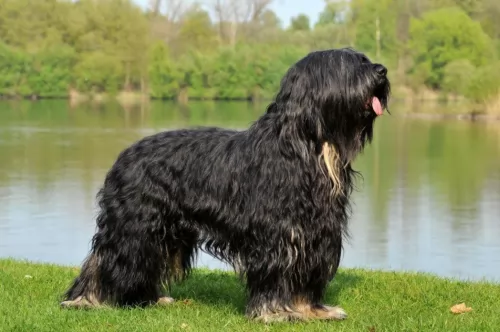 The Cão da Serra de Aires is such a loyal dog to his human family that he makes a splendid pet. He is active, having worked historically at herding and guarding.
The Cão da Serra de Aires is such a loyal dog to his human family that he makes a splendid pet. He is active, having worked historically at herding and guarding.
Socialization and obedience training ensure that he becomes an exceptional pet and he has a host of positive attributes to his name – he is intelligent, energetic, loyal and loving. He may have been used long ago to guard livestock, but today he is selected as a pet specifically for his excellent companionship and for his protective nature.
 Your Schnorkie is a jaunty little dog who is going to love playing games with you. Children will need to treat him with gentleness and respect simply because he is small.
Your Schnorkie is a jaunty little dog who is going to love playing games with you. Children will need to treat him with gentleness and respect simply because he is small.
He is social, friendly and loving with his human family, though sometimes, coming from the Schnauzer, he gets a bit moody.
He makes a great family pet though and and while he loves to be outside playing, he also loves to come indoors and be everybody’s lap dog for the evening.
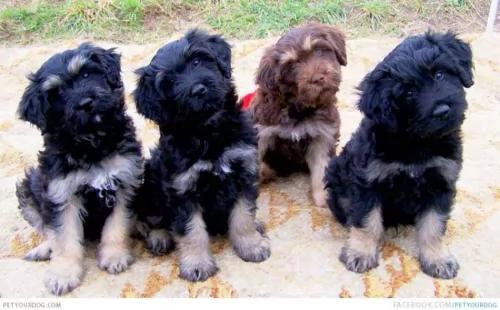 As with most dogs that are looked after well, their health can be good. The Cao da Serra de Aires isn’t likely to keep you at the vet often. Just like with any good dog, there are some health disorders that can benefit you to know about.
As with most dogs that are looked after well, their health can be good. The Cao da Serra de Aires isn’t likely to keep you at the vet often. Just like with any good dog, there are some health disorders that can benefit you to know about.
Being forewarned , you can get your pet to the vet quickly before the illness gets out of hand.
There are some pet owners who want to have their pets tested by the Orthopedic Foundation for Animals as well as the Canine Eye Registration Foundation to rule out health defects such as hip dysplasia and cataracts before they manifest themselves in their pets. This is of particular importance to breeders so as to prevent the parent dogs passing bad genetic conditions to the puppies.
This is a common skeletal disease where the dog’s hip joints don’t develop properly. It can be terribly painful for your pet to get around. It’s a genetic condition and while it is more prevalent in big dogs, any breeds are susceptible.
Your dog will battle along with painful joints and sometimes his hind-end will be lame. You’ll notice that once lying down, he battles to get up again. Fortunately vets are well acquainted with this ailment and they have different options to treat and manage it.
Cataracts in your dog come about from a disease process which affects the lens of the eye. The eye loses its transparency and impairs vision. There are some instances where cataracts can cause blindness. You’ll see a whitish gray area in your pets eye. The most common cause of cataracts is genetics. Get your pet to the vet who will do certain tests to evaluate the eyes and make a recommendation.
 Your Schnorkie, as a hybrid breed, can inherit some health problems from either parent – the Schnauzer or the Yorkshire Terrier.
Your Schnorkie, as a hybrid breed, can inherit some health problems from either parent – the Schnauzer or the Yorkshire Terrier.
Then again, mixing pure bred dogs can eliminate some common dog ailments. Overall, the Schnorkie is a healthy dog and can live up to 15 years of age.
A couple of major health concerns with the Schnorkie are dental problems and pancreatitis.
If your dog has tooth problems he might be in terrible pain and that is why it is so important to look inside his mouth.
Dogs can break their teeth and they can also get gum disease. Dogs have a more alkaline mouth and this is what encourages plaque. Try and brush your pet’s teeth with special canine toothpaste and toothbrush because dental disease can cause lots of problems for your pet.
The pancreas helps with the digestion of food and to regulate blood sugar. Pancreatitis is more common in Schnauzers, and then the pancreas is swollen and inflamed.
Dogs with this disease will lose their appetite, be lethargic, restless and have stomach pain. You may see your pet hunching his back. Pancreatitis can lead to organ damage and you will need to get your dog to the vet.
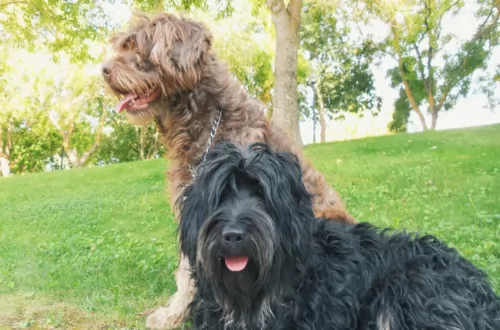 As a working dog used to long hours of action, the Cao da Serra de Aires will need lots of activity. He’ll need you taking him for long walks and playing ball games with him. He can become frustrated and destructive when left without any physical stimulation.
As a working dog used to long hours of action, the Cao da Serra de Aires will need lots of activity. He’ll need you taking him for long walks and playing ball games with him. He can become frustrated and destructive when left without any physical stimulation.
The Cao da Serra de Aires may have long hair but he isn’t high maintenance. He won’t require professional grooming, but will require a good brush a least twice a week. This is because the long coat can tangle.
To keep him looking his best, you’ll want to be trimming the hair around his paws. Another important grooming task is checking his ears and cleaning them. You have to be careful about cleaning your pet ears if you don’t know how, as it could damage the ears. Your vet can always advise you on how this is done.
 Puppies will need 4 small meals a day, but by 8 weeks your Schnorkie will be ready to move onto dry dog food. As he grows into an adult you will cut the meals down to two a day.
Puppies will need 4 small meals a day, but by 8 weeks your Schnorkie will be ready to move onto dry dog food. As he grows into an adult you will cut the meals down to two a day.
The best commercially manufactured dry dog food is able to meet your dogs nutritional needs and it’s super convenient too. It can be a good idea to feed your pet some home-made food too. Twice a week will be sufficient to add in this home-made food - boiled chicken, brown rice or pasta, sweet potatoes, carrots and spinach will be excellent for him and his digestion and be a tasty treat for him. You can simply chop it up and add it to the dry kibble. Some raw meat occasionally can help to ward off nasty skin ailments. Make sure that your Schnorkie has a constant supply of cool fresh water.
Schnauzers and Yorkies both have high maintenance coats and your Schnorkie will also require regular brushing, though he doesn’t shed much. Some people prefer to hand their dogs in and have them professionally groomed.
Just because a Schnorkie is a little dog, doesn’t mean he doesn’t need exercise. You don’t want a small dog like this getting obese and unfit. Take him for walks and give him some ball games.